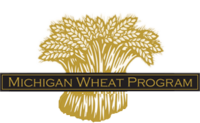On-line registration now open for March 21st event
Lansing, Mich. (January 18, 2018) – The Michigan Wheat Program’s 6th Annual Winter Grower Meeting is now open for registration. The event is set for the Grand Garden Room at Eagle Eye Conference Center in Bath Township on Wednesday, March 21. Admission is free to wheat growers and stakeholders interested in learning what’s new with Michigan wheat, but pre-registration is requested.
This year’s Annual Winter Grower Meeting kicks off at 9 a.m. after an 8:15 registration, continental breakfast and opportunity to visit the tradeshow. Pre-registration is now live at miwheat.org at the top of the “What’s Hot” column on the left edge of the page. Meeting attendance is free, but pre-registration is requested to ensure adequate food, seats and handouts for attendees.
The keynote speaker for the March 21st event is an encore appearance by Canadian wheat specialist Peter Johnson, a popular speaker at the 2015 Annual Winter Grower Meeting. The day-long program is slated to have several other presentations and a trade show.
“With quality speakers like Peter Johnson, who was requested back by our growers, and a panel discussion by growers who studied wheat production in Germany last summer, Michigan wheat farmers can get some new ideas of things they would like to try on their own farms,” said David Milligan, chairman of the Michigan Wheat Program and a Cass City farmer. “In these tough times, we need to bring information to growers that can help their bottom line.”
“Developing quality grower programs is an important function of the Michigan Wheat Program and our board takes it very seriously,” Milligan added. “It is another important way we keep wheat farmers informed of not only what we’re doing as an organization, but what innovation is occurring in the industry.”
Peter Johnson is well-known in Canada and the US for his work on wheat. He recently retired from his position as provincial cereal specialist with the Ontario Ministry of Agriculture, Food and Rural Affairs. He has also served as treasurer and past-chair of the Ontario Cereal Crop Committee; chair of the Wheat Technical Working Group; and co-founder of the Great Lakes Wheat Workers group.
At the March 21 event, Johnson will present High-Yield Wheat: Setting the Stage and also Management for High Yields. Other presentations at the meeting include:
- Farm Bill Update by the Hon. US Senator Debbie Stabenow (invited) and Joe Shultz, US Senate Agriculture, Nutrition & Forestry Committee.
- An Update on the Michigan Wheat Program by executive director Jody Pollok-Newsom.
- A grower panel on German Wheat Production with Mike Milligan and Jeff Krohn who both went to Germany earlier this year and made several visits with Dennis Pennington, MSU wheat specialist who will moderate the session.
- 2018 Resources Available to wheat growers by Martin Nagelkirk, MSUE wheat educator, and Dennis Pennington, MSU wheat specialist.
- Grower Needs Survey by Pennington to get feedback on research focus and new issues.
- Eight RUP credits and 4 CCA credits are available in crop management and .5 credits in nutrient management for meeting attendees.
Farmers are also invited to visit the trade show, which will have a variety of industry displays.
There is no cost to attend the 2018 Annual Winter Grower Meeting, but advance registration is required to ensure the lunch count, adequate seating and handouts. The complete itinerary and registration information may be found at miwheat.org at the top of the “What’s Hot” column on the left edge. Farmers may also register by phone by calling: 888-WHEAT01 (888-943-2801).
The Michigan Wheat Program is funded by the state’s farmers who grow wheat in 50 of Michigan’s 83 counties. The Michigan Wheat Program board seeks to promote the state’s wheat industry by funding and supporting the strategic priorities of wheat farmers working with input suppliers, seed producers, millers, end users and consumers. Research on wheat production practices and grower education has been an early priority for the organization.
